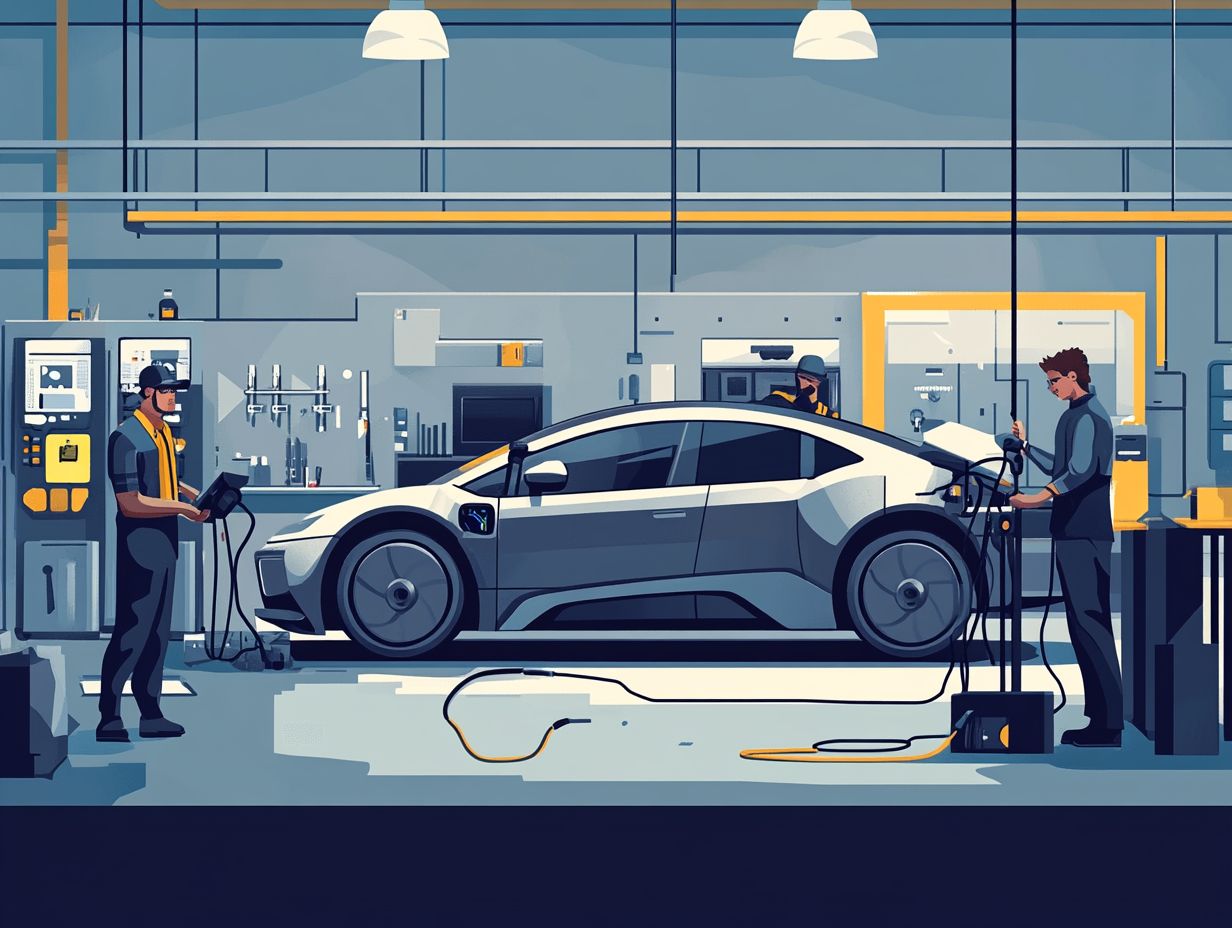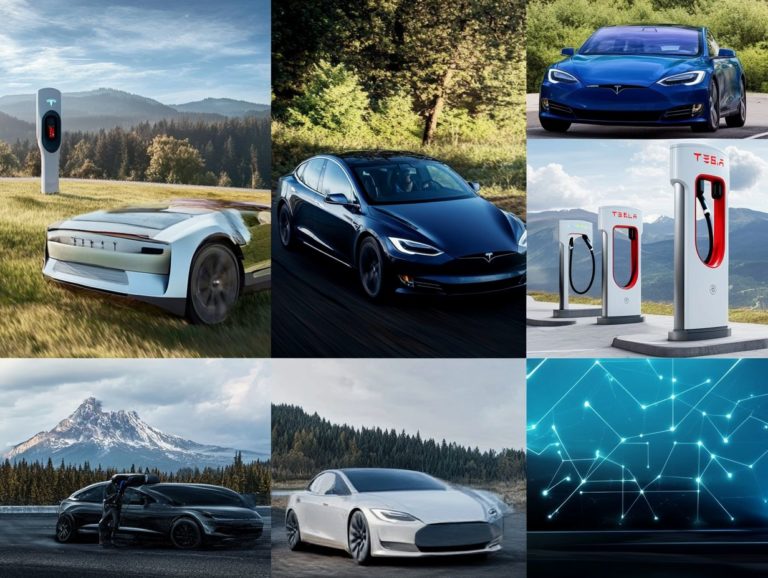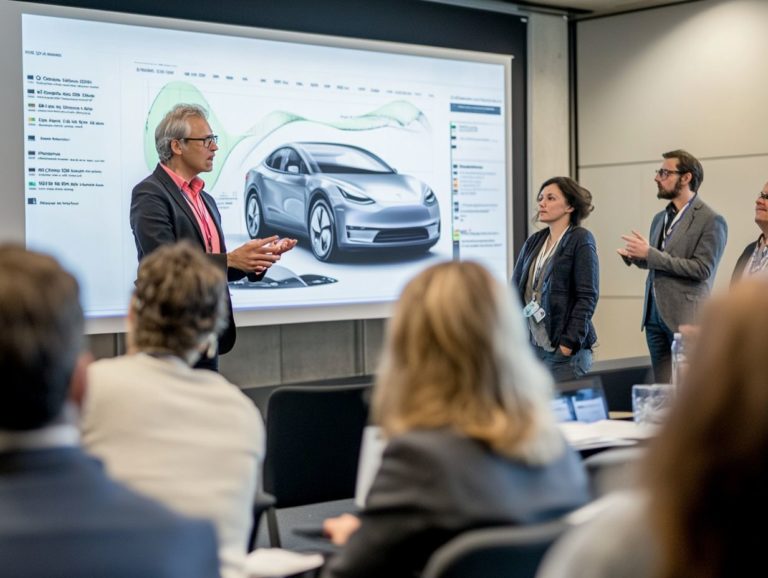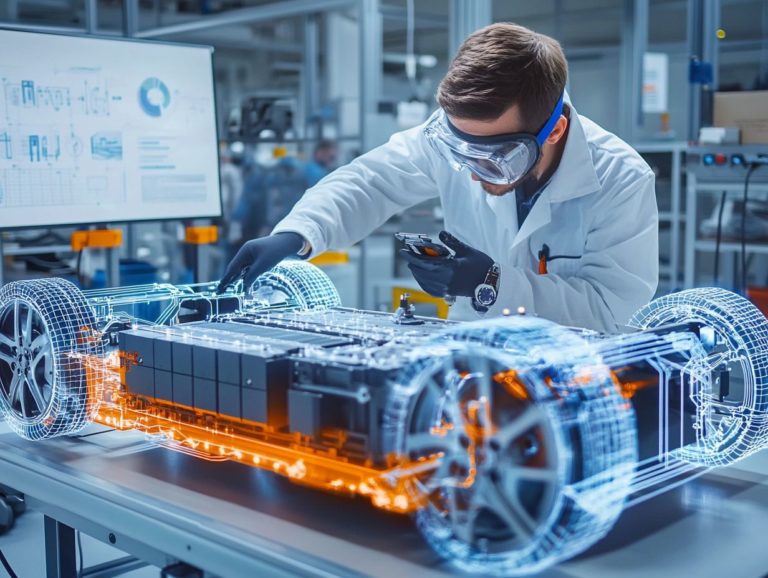The Impact of Electric Vehicles on the Job Market
Electric vehicles (EVs) are not just a passing trend. They represent a major shift in the automotive industry and job market.
As EVs gain popularity, they create both challenges and opportunities for job seekers. Traditional roles are changing, and new skills are in demand.
This article explores the rise of EVs, current job trends, and what this means for those in manufacturing and maintenance.
Learn how government policies are driving this growth and what it means for your career in electric mobility.
Contents
- Key Takeaways:
- The Rise of EVs and Its Effects on the Job Market
- Challenges and Opportunities for Job Seekers in the Electric Vehicle Industry
- Impact of EVs on Traditional Automotive Jobs
- The Role of Government Policies in the EV Job Market
- Frequently Asked Questions
- What is the current state of the job market in relation to electric vehicles?
- How do electric vehicles impact traditional jobs in the automotive industry?
- What are some specific job opportunities in the electric vehicle market?
- Do electric vehicles have a positive or negative impact on the job market?
- What skills and qualifications are needed for a career in the electric vehicle market?
- How Can I Get Ready for a Career in Electric Vehicles?
Key Takeaways:

- The rise of electric vehicles has created a demand for new skills and qualifications, providing opportunities in the EV industry.
- EV growth is impacting traditional automotive jobs, prompting a shift towards roles in manufacturing, maintenance, and more.
- Government support, through incentives and job training programs, shapes the job market by creating pathways into the EV industry.
What are EVs and How Do They Work?
Electric vehicles (EVs) represent a significant advancement in automotive technology. They reduce reliance on fossil fuels and cut down greenhouse gas emissions.
These cars use advanced battery systems and software to power electric motors. They often outperform traditional combustion engines in efficiency.
As the EV industry grows, it meets strict emissions standards and builds the charging infrastructure needed for widespread use.
In the EV world, you ll find options like Battery Electric Vehicles (BEVs) and Plug-in Hybrid Electric Vehicles (PHEVs).
BEVs run entirely on electricity stored in lithium-ion batteries. This means a zero-emission driving experience.
PHEVs combine an internal combustion engine with an electric motor, offering flexible driving modes and lower fuel consumption.
Both types use complex components, such as battery management systems and regenerative braking, to maximize efficiency and range.
Given the growing concern about climate change, adopting EVs is crucial. They help promote cleaner air and reduce the carbon footprint of personal transportation.
The Rise of EVs and Its Effects on the Job Market
The rise of electric vehicles (EVs) is not just changing how we travel; it’s redefining the job market across various sectors.
As demand for electric cars increases, the U.S. Bureau of Labor Statistics predicts a surge in related jobs. This means exciting green opportunities in battery manufacturing, software development, and charging infrastructure.
This shift in the automotive landscape offers unique opportunities. Skilled workers like vehicle assemblers and construction professionals can thrive in a clean economy.
By transitioning to EV roles, they contribute directly to the fight against climate change.
Current Job Market Trends in the Electric Vehicle Industry
Current job market trends in the electric vehicle (EV) industry reveal rapid growth, with numerous job opportunities emerging in various fields. These fields include:
- Battery manufacturing
- Software development
- Charging infrastructure
This surge is primarily driven by increasing consumer demand for electric vehicles and a collective push for a clean economy aimed at reducing carbon emissions. As companies like Stellantis and Volkswagen ramp up their production efforts, the need for skilled professionals in the EV sector is on the rise.
Software developers who can create innovative applications for vehicle management and performance optimization are highly sought after. Vehicle assemblers who can effectively bring components together on the production line are also in high demand.
This rapidly evolving landscape requires industry leaders to adjust quickly to market demands by investing in advanced technologies and sustainable practices. As a job seeker, now is your chance to refine your skills in these growing areas. With attention shifting toward green jobs, you have a unique opportunity to align your career path with sustainability principles, ultimately contributing to a more eco-friendly future.
Projected Job Market Changes with the Growth of Electric Vehicles
Projected job market changes in the electric vehicle industry indicate that a significant shift is on the horizon over the next decade, with an anticipated increase in job opportunities across various economic sectors. As the transition to electric vehicles gains momentum, industries will adapt to meet the rising demand for skilled labor, especially in:
- Battery manufacturing
- Charging infrastructure development
Reputable reports suggest that the electric vehicle sector could generate thousands of new jobs, profoundly impacting regional planners in states like California and Texas.
The Bipartisan Infrastructure Law and the Inflation Reduction Act are crucial players in this transformation, providing financial incentives and funding for renewable energy technologies. According to recent studies, the job growth rate in this sector could soar to as high as 30% by 2030, with roles in:
- Engineering
- Manufacturing
- Maintenance
Skills in software development, renewable energy technologies, and advanced manufacturing will be in high demand, creating a robust workforce ready to support the evolution of sustainable transport solutions. These projections emphasize the pressing need for professional training programs and illuminate the potential for economic revitalization in communities eager to embrace these changes.
Challenges and Opportunities for Job Seekers in the Electric Vehicle Industry

The evolving landscape of the electric vehicle industry offers both challenges and exciting opportunities for job seekers like you who aim to carve out a successful career in this burgeoning field. With the increasing demand for electric vehicle positions, there s a notable need for skilled individuals, particularly in:
- Battery manufacturing
- Software development
However, the swift pace of technological advancements and production methods can present hurdles, especially if you re transitioning from traditional automotive manufacturing roles.
Start exploring these exciting career paths today!
In-Demand Skills and Qualifications
As the EV industry continues to expand, there is an increasing demand for specific skills and qualifications that align with the needs of electric vehicle jobs. Key in-demand skills include:
- Expertise in battery manufacturing
- Software development
- A solid understanding of emissions standards that govern vehicle performance and environmental impact
You may also notice that construction workers skilled in building charging infrastructure are essential to support the growth of electric vehicles across various regions.
Roles such as electrical engineers, data analysts, and maintenance technicians are important in this field, each requiring a unique skill set. For instance, electrical engineers need a strong foundation in circuit design and renewable energy technologies. Data analysts should be good at analyzing large amounts of data to find patterns in EV performance data.
Transitioning from traditional automotive roles to specialized positions in the EV sector is achievable through tailored education programs, certifications, and hands-on training offered by universities and industry organizations. Get ready to position yourself at the forefront of this booming industry by adapting your existing knowledge to align with emerging technologies.
Potential Job Opportunities in the EV Industry
The potential job opportunities within the EV industry are vast and diverse, covering a range of roles from battery manufacturing to regional planning for charging infrastructure. As the demand for electric vehicles continues to surge, companies like Ford and Audi actively seek skilled professionals to fill positions such as:
- Vehicle assemblers
- Software developers
- Construction workers committed to expanding charging networks
This increasing demand creates an exciting landscape for job seekers eager to engage with a sustainable and innovative economic sector.
Beyond traditional automotive roles, sectors like renewable energy, telecommunications, and materials science are becoming intertwined with the EV landscape. Positions in research and development, electric motor design, and supply chain management are essential for the industry’s growth. Companies like Tesla and Rivian are leading the charge, while established suppliers such as Panasonic invest significantly in talent acquisition.
To position yourself for success in this dynamic field, focus on obtaining relevant certifications now, networking within the industry, and keeping abreast of technological advancements. These strategic steps can enhance your employability and ensure you stand out in this thriving sector.
Impact of EVs on Traditional Automotive Jobs
The impact of electric vehicles (EVs) on traditional automotive jobs is profound and multifaceted, marking a significant transformation toward a more sustainable future. As the demand for electric cars continues to surge, you may notice many traditional roles in automotive manufacturing evolving or becoming obsolete.
This shift opens up a wealth of new job opportunities within the EV sector. It is essential to reevaluate the skills that are becoming increasingly relevant in today s job market, especially as companies like Daimler and Toyota transition to electric vehicle production.
Explore your career options in the EV industry today!
Effects on Manufacturing and Maintenance Jobs
The impact of electric vehicles on manufacturing and maintenance jobs is profound. It fundamentally reshapes the automotive workforce you engage with. As the EV industry expands, there is an increasing demand for specialized manufacturing roles that focus on battery production, vehicle assembly, and combining different parts of the vehicle.
Maintenance jobs are evolving, necessitating new skills related to electric vehicle technology. You may need to invest in training and adapt to keep pace with these changes.
This transition meets the urgent need for skilled labor and underscores the importance of continuous professional development. Traditional automotive companies are now pouring resources into training programs designed to educate electricians and mechanics on high-voltage systems and vehicle software management.
Industry giants like Ford and General Motors have restructured their workforces, integrating roles such as diagnostics technicians and battery engineers. These adjustments highlight a broader trend where employees must become adept in software and electronic systems to maintain competitiveness in an ever-evolving marketplace.

Transitioning to EV-related jobs is vital for you in the automotive manufacturing sector, especially as traditional roles slowly fade into the background. This shift opens up thrilling new challenges and opportunities for those eager to enter the electric vehicle industry. To thrive in this evolving job landscape, acquiring new skills in areas like battery technology and software engineering will be essential.
To ease this transition, don t miss out on specialized training programs that focus on electric vehicle systems, sustainability practices, and advanced manufacturing techniques. Numerous online platforms offer courses tailored specifically to these emerging skills, allowing you the flexibility to learn at your own pace and according to your schedule.
Engaging in workshops and industry conferences can open doors to invaluable networking opportunities and keep you informed about the latest advancements in EV technology. Additionally, mentorship programs can be incredibly beneficial as experienced professionals share their insights and guide you through the complexities of this dynamic field.
The Role of Government Policies in the EV Job Market
Government policies significantly influence the job market for electric vehicles (EVs). Recent legislation aims to strengthen the industry and foster job growth. The Bipartisan Infrastructure Law and the Inflation Reduction Act exemplify initiatives crafted to elevate the EV sector by allocating funds for charging infrastructure and incentivizing green jobs.
These policies not only facilitate the growth of electric vehicles but also cultivate a welcoming landscape for job seekers eager to dive into this cutting-edge economic arena.
Incentives and Support for EV Industry Growth
Incentives and support for the growth of the electric vehicle (EV) industry are essential for fostering job creation and driving economic development in this promising sector. These incentives often manifest as tax breaks, grants, and funding aimed at advancing battery manufacturing, infrastructure development, and the creation of electric vehicle jobs. This support plays a pivotal role for companies like Ford and Stellantis as they pivot towards a more sustainable production model.
These incentives can catalyze partnerships between private enterprises and government entities, creating a synergistic effect that accelerates innovation. For example, California s aggressive rebate programs for both consumers and manufacturers have significantly boosted demand and spurred new ventures.
Initiatives such as the federal EV tax credit have made electric vehicles far more accessible, further stimulating market growth. By nurturing a robust ecosystem, these incentives enhance job opportunities in sectors like manufacturing and research, helping local economies flourish as they evolve into hubs for clean technology advancements.
Job Training and Education Programs
Job training and education programs are vital for equipping you for the rapidly expanding EV industry. The demand for skilled labor continues to surge, leading many institutions to roll out specialized training programs focusing on essential skills for electric vehicle positions, such as battery technology, maintenance, and software development. These educational initiatives ensure you have the necessary knowledge to excel in the EV sector.
Many community colleges and vocational schools are stepping up to offer hands-on training in this dynamic field. Partnerships between automotive companies and educational institutions create tailored courses that align with industry standards, giving you the chance to gain valuable practical experience.
These collaborations equip you with essential skills and create networking opportunities that can lead to employment in a competitive job market. Online courses and certification programs are also becoming increasingly popular. This flexibility makes your entry into the electric vehicle job market more accessible than ever.
Frequently Asked Questions
What is the current state of the job market in relation to electric vehicles?

The job market for electric vehicles is rapidly growing, with an increasing demand for skilled workers in various fields, including manufacturing, engineering, and maintenance.
How do electric vehicles impact traditional jobs in the automotive industry?
The rise of electric vehicles has led to a decline in traditional automotive jobs, such as those in gasoline and diesel engine production. However, new jobs are emerging in the electric vehicle sector, providing opportunities for workers to transition into this field.
What are some specific job opportunities in the electric vehicle market?
Job opportunities in the electric vehicle market include electric vehicle engineers, battery technicians, electric car mechanics, and charging station installers. There are also roles in research and development, marketing, and sales.
Do electric vehicles have a positive or negative impact on the job market?
Overall, electric vehicles positively impact the job market. While traditional automotive jobs may be affected, the growth of the electric vehicle industry is creating new job opportunities and driving economic growth, as detailed in what is the impact of EVs on the economy?
What skills and qualifications are needed for a career in the electric vehicle market?
The specific skills and qualifications needed depend on the job. Generally, a background in engineering, technology, or automotive mechanics is beneficial. Knowledge and experience in renewable energy and sustainability are becoming increasingly valuable in this market.
How Can I Get Ready for a Career in Electric Vehicles?
To prepare for a career in the electric vehicle market, consider taking courses or gaining experience in fields such as renewable energy, automotive technology, or engineering. Networking with professionals in the industry and keeping up with the latest developments in electric vehicle technology can also help.
Don t miss out on the opportunity to explore training programs at your local community college or online resources to jumpstart your career in the electric vehicle industry!






